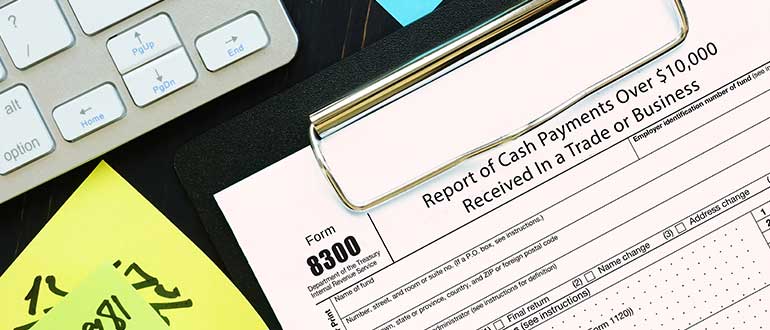
What is Form 8300? It is a document used by businesses to report cash transactions exceeding $10,000 in a single transaction or in a series of related transactions. It is required by the Internal Revenue Service (IRS) as part of the Bank Secrecy Act (BSA) and is used to help prevent money laundering and other illegal activities that involve large amounts of cash. In this post, we will explore the purpose and requirements of Form 8300 in more detail.
What Is Form 8300?
Businesses must disclose specific cash transactions to the IRS using Form 8300. These transactions consist of receiving more than $10,000 in cash in a single transaction or a string of connected transactions. Businesses must fill out the form with information on the transaction and the parties involved.
Who Is Required to File Form 8300?
Any business that receives cash payments in excess of $10,000 in a single transaction or in a series of related transactions is required to file Form 8300. This includes businesses that sell goods or services, as well as individuals who engage in business activities, such as selling real estate or conducting auctions.
What Transactions Must Be Reported on Form 8300?
Any cash transaction that exceeds $10,000 in one transaction or a string of connected transactions requires the filing of Form 8300. This includes transactions such as the sale of a car or boat, the purchase of jewelry or other luxury goods, or the payment of rent in cash. The form must also be filed for transactions that are part of a larger transaction or series of transactions that exceed $10,000.
What Information Must Be Reported on Form 8300?
Businesses must fill out Form 8300, which requests information about the transaction, including the date, the sum of money received, and the nature of the transaction. Businesses must also include information on the people involved in the transaction, such as their names, addresses, and social security numbers or taxpayer identification numbers, on the form.
When Must Form 8300 Be Filed?
After the transaction, Form 8300 must be submitted within 15 days. The form needs to be submitted by the following business day if the transaction takes place on a weekend or holiday. The Financial Crimes Enforcement Network’s (FinCEN) BSA E-Filing System must be used to submit the form online.
What Are the Consequences of Failing to File Form 8300?
Failure to file Form 8300 can result in penalties and fines. The penalty for failing to file a correct and complete Form 8300 can be up to $25,000 per violation. In addition, willful failure to file or filing a false or fraudulent Form 8300 can result in criminal penalties, including fines and imprisonment.
What Are the Benefits of Filing Form 8300?
Companies can avert penalties and fines for failing to comply with the BSA by submitting Form 8300. Additionally, it can aid companies in identifying and avoiding illegal practices like money laundering and financing terrorism. By reporting large cash transactions, businesses can help law enforcement agencies identify and investigate suspicious activities.
Are There Any Exceptions to the Form 8300 Filing Requirement?
There are certain exceptions to the Form 8300 filing requirement. For example, transactions that are conducted through a financial institution are not required to be reported on Form 8300 because the financial institution is already required to file a Currency Transaction Report (CTR) with FinCEN. Similarly, transactions that involve personal payments, such as gifts or loans, are not required to be reported on Form 8300.
Can Businesses Use a Third-party to File Form 8300?
Businesses can use a third party to file Form 8300 on their behalf. However, businesses are ultimately responsible for ensuring that the form is filed correctly and on time.
How Long Must Businesses Keep Records Related to Form 8300?
Businesses are required to retain records related to Form 8300 for a period of five years from the date the form is filed. These records must be made available to the IRS upon request. Businesses should ensure they have a system in place to retain and organize these records to comply with the recordkeeping requirements of Form 8300.
Form 8300 is a reporting form used by businesses to report cash transactions exceeding $10,000 in a single transaction or in a series of related transactions. It is required by the IRS as part of the BSA and is used to help prevent money laundering and other illegal activities. Businesses that receive cash payments exceeding $10,000 should ensure they are complying with the requirements of Form 8300 to avoid penalties and fines.
